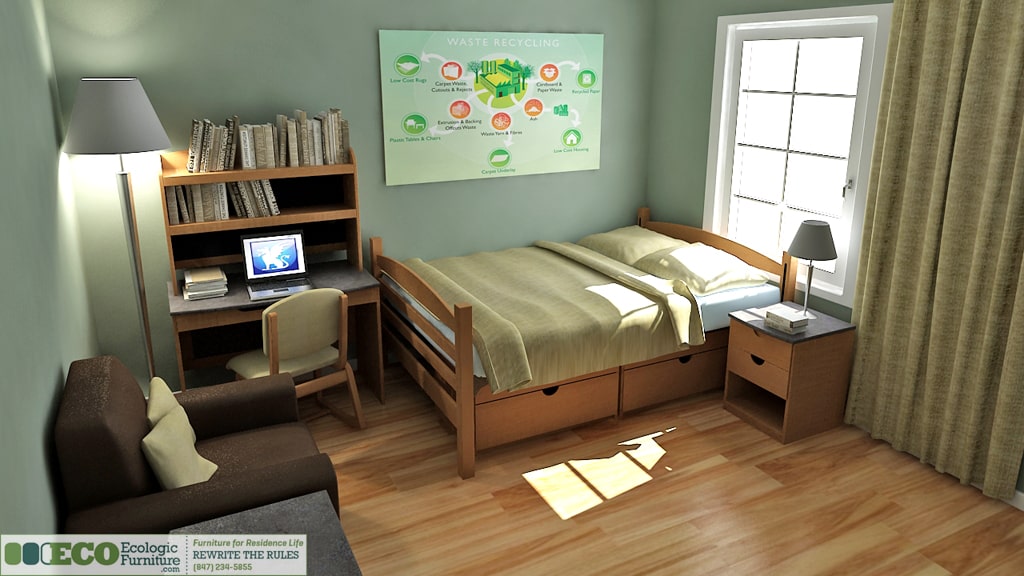The fabric industry faces significant challenges today. As Julia Silas writes in The Future of Fabric – Health Care, “The past 50 years of synthetic material development has brought significant material performance improvements in fabric. These improvements, however, are now beginning to be haunted by growing concerns about the health and environmental impacts of those materials and the finishes and treatments added to them.”
All of the petrochemical-based fibers in use today share a common legacy of emitting toxic chemicals in the process of refining the oil or gas from which these plastics are made. Vinyl, however, has come under more intense scrutiny due to the extreme toxicity of additional chemicals involved in its production. A recent analysis of plastics commonly used in fabric for furniture placed PVC as the least preferable plastic of all those studied.
PVC
Polyvinyl chloride (PVC) — commonly referred to as vinyl — is a chlorinated plastic polymer used in the United States for furniture lounge seating. Long recognized as inexpensive and easy to clean, vinyl upholstery fabric is widely found in student lounge furnishings. The health care industry has targeted PVC vinyl for elimination primarily due to dioxins, which are a set of chemicals uniquely associated with PVC.
PVC is likely the leading source of dioxins found in the environment. Dioxins include some of the most potent carcinogens. Dioxins are one of only 12 chemicals targeted for elimination by the Stockholm Convention on Persistent Organic Pollutants (POPs). A U.S. Green Building Council’s (USGBC) Technical Science Advisory Committee (TSAC) report on PVC in building products confirmed that “dioxin emissions puts PVC consistently among the worst materials for human health impacts.”
Green Furniture
The good news about fabric for student lounge furniture is there are better alternatives than using PVC vinyl. Ecologic Furniture has been a proponent of sustainability in its furniture solutions since its founding more than 20 years ago. While Ecologic builds its lounge furniture to its customers’ custom specifications, it always encourages the use of its 100 percent PVC-free recycled leather and 100 percent PVC-free coated fabric.
As Larry Herringdine commented about Fayetteville State University’s selecting Ecologic Furniture for its LEED Silver new apartment complex, “FSU promotes and advertises its green programs to prospective students, so the furniture also had to exemplify the school’s commitment to sustainability as a ‘core value of institutional operations, planning, capital construction, and purchasing practices.’ The residence hall’s furniture had to be durable and low-maintenance. And finally, the furniture had to be affordable.” Ecologic’s PVC Free Coated Fabric’s durability exceeds the more commonly used PVC vinyl in the student lounge marketplace. Comments Ken Klein, president of Ecologic, “Our end-users are students. As such, durability and ease of maintenance is critical in our application. Our fabric standards are the highest in the student furniture industry exceeding 200,000 cycles and adhering to the flammability standards of California Tech. Bulletin 117. In addition, our coated fabrics can be cleaned with water- based solutions.”
Universities and developers of student housing both on and off campus need to be aware of the hazards of PVCs in their portfolios. This health hazard is real and needs to be addressed. If you have questions about the use of PVC in your student lounge furniture and what green furniture options exist to eliminate it from your portfolio, please call us at 847-234-5855 or email info@ecologicfurniture.com.
 ECOLOGIC’S product solutions are designed and constructed for the demanding needs of the residence life market.
ECOLOGIC’S product solutions are designed and constructed for the demanding needs of the residence life market.
 Our furniture is engineered and manufactured to the highest standards and will give years of maintenance-free service.
Our furniture is engineered and manufactured to the highest standards and will give years of maintenance-free service.
 For over 25 years, now we have been a pioneer in sustainable business practices, recycling and green manufacturing.
For over 25 years, now we have been a pioneer in sustainable business practices, recycling and green manufacturing.
 Our customer service agents are happy to provide more information, answer any questions, or even create a quote for you! Call us now! (847) 234-5855 or use our form.
Our customer service agents are happy to provide more information, answer any questions, or even create a quote for you! Call us now! (847) 234-5855 or use our form.



